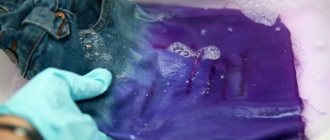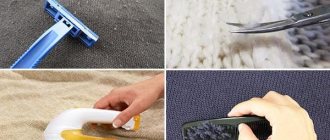At least once, almost every woman encounters such an annoying circumstance when, having washed her favorite item from her wardrobe and dried it, she suddenly discovers that not only has its original appearance changed, but the item has also shrunk. Basically, the reason lies in the wrong washing mode, when the product is washed, or in very hot water, or using the wrong detergent, and there is also a third option - the characteristics of the material from which the item is made.
Every housewife should understand that things can shrink due to the natural materials from which they are made. Therefore, to avoid such unforeseen situations, it is necessary to strictly follow the instructions that are indicated on the tag or label of the clothing.
If such an incident does occur and the item shrinks, you can try to return it to its normal state.
What's wrong with synthetic clothing?
Moreover, synthetics are durable, since they are absolutely impervious to rotting and the effects of captivity. ... Another advantage of synthetics is its strength and wrinkle-resistance; it holds the shape of clothes perfectly. Also, many types of fabrics have water-repellent properties, which can be useful for sewing raincoats and jackets.
Interesting materials:
How long after dismissal? Whose are the Kuril Islands now? What's hot on Instagram 2022? What irritates you the most? What will happen to Vmenenka? What does melatonin do? What does origin access provide? What does an Origin Access Basic subscription provide? What does spinal stretching do? What does Riboxin do?
What to do if the item shrinks after washing
There are many different time-tested methods that do not require additional financial investments that will help return things to their original condition. Typically, clothes made from natural fiber - wool - need stretching. It is this fabric that is the most capricious in its care. In addition to wool, cotton, knitwear and calico, which are also made from natural fibers, can shrink. Viscose also shrinks when washed. This article discusses possible options on how you can save your favorite clothes and return them to their normal state, that is, how to stretch an item that has shrunk after washing.
So, what to do if the item shrinks?
How to stretch cotton clothes
Cotton is a practical and inexpensive natural material from which a variety of clothes are made. Cotton shrinks after washing, mainly due to the fact that the wrong temperature mode was chosen, and subsequently improper drying of the products. To return deformed cotton clothes to normal condition, you can use the recipe below. Let's consider this method using the example of a cotton shirt, which for some reason shrank after washing:
- a deformed cotton shirt is soaked in not hot water. For 10 l. water you need to take 3 tbsp. l. vinegar or hydrogen peroxide and leave for 30 minutes; - take a towel and spread it on a flat surface, lay out the soaked item and begin to evenly stretch the item in problem areas. If this is a sweater or T-shirt, then you need to put your hands inside the item to your shoulders and start stretching. If it is necessary to stretch the bottom of the item, then stretch the edges of the clothing to the required size; - Place the clothes on a towel and leave until completely dry. It is recommended to repeat the stretching several times. The next time you wash the shirt, you should wash it with a milder detergent and at a lower water temperature than before.
How to stretch a wool item
Wool, like cotton, tends to shrink, especially when the water temperature is not maintained or due to hard washing powder. It is always necessary to carefully select washing powder, and it is advisable to use one that is designed for washing woolen products. If such an unpleasant thing happens, such as woolen clothes shrinking after washing, you can try some options that will help restore such products to their original appearance. For example, in our example, the hat shrank after washing.
If a woolen item shrinks after washing, do the following:
- fill the container with warm water and add a small amount of shampoo or any mild conditioner to it;
- Place the woolen hat in a bowl of water and leave for 30 minutes. Then we take out the woolen hat and rinse it thoroughly in cold water.
You can use another option, which will also help restore the product’s softness and elasticity: pour 5 liters of water into a container, to which add 3 tablespoons of ammonia, 1 tablespoon of turpentine and 1 tablespoon of vodka. Dip a woolen item into this composition for more than an hour, then begin to stretch it.
The product is pulled out, carefully wrung out, and they begin to stretch it. The wool product is stretched in small parts, smoothly moving from one section to another, until the item completely returns to its size. Then the product should be hung on hangers and stretching should be repeated periodically until the wool is completely dry.
How to stretch knitwear
You can try stretching knitted items that have shrunk in several ways:
Warm water is poured into the container in which the knitwear is soaked for about 15 minutes so that it is completely saturated with water. Then put it in the washing machine and turn on the “spin” mode. After the product has passed the centrifugation cycle, you can begin stretching it. It is recommended to dry knitwear in a vertical position. If you use a towel to dry, the item may return to its original state. When the product is dry, you can iron it and evaluate the final result;
The knitted product is placed in warm water for about 30 minutes. Then gently squeeze it out, removing any remaining water, but you can’t twist it out. The wet product is laid out on a towel and rolled together with the towel for 10-30 minutes. Then the towel is unrolled and the item is transferred to the ironing board. The iron is heated and the product begins to steam until it dries completely, while simultaneously stretching the problem areas. The treated product is dried in a horizontal position on a dry towel. If stretching the item is difficult, you can soak it in hair conditioner.
Resuscitation of viscose items
In the modern textile industry, the most popular material for sewing a wide range of clothing is viscose. Products made from viscose are very comfortable and practical. Various things are made from viscose for almost all seasons of the year: dresses, sweaters, T-shirts, coats, and many other things, but if they are not properly cared for, like woolen items, they can shrink. An iron can be used to return a viscose product to its original condition. The principle of this method is exactly the same as with a knitted item. Let's consider an option using the example of a viscose coat, which after washing became deformed and changed its original appearance. You will need an iron that has a powerful steam function. You can try to steam the coat with an iron, and at the same time stretch its problem areas, then hang the coat on hangers and let it dry. True, there is another option for drying things, which is suitable for any product, this is drying on yourself, which sometimes brings some discomfort to the owner.
Saving polyester items
Products made from polyester are distinguished by their ease of use, and if you care for them properly, then, as a rule, they do not present any unexpected surprises. Items made of polyester are washed using a cold wash cycle, then they do not stretch or fade. But if suddenly such a nuisance occurs, then you can use the method of stretching the wet product with your hands or using an iron. It must be remembered that polyester products are afraid of high temperatures.
To avoid the question of how to stretch a product in the future, you must adhere to the basic rules. So, how to wash something properly so that it doesn’t shrink?
- all items that are made of such material that there is a risk of shrinkage must be washed by hand, and if they are still washed in a machine, then you need to set the delicate wash mode;
- for the washing itself, those washing powders or conditioners that are most suitable for this type of material will be used;
- water should have a temperature of no more than 40 degrees;
- washing and rinsing should take place at the same temperature, that is, avoid sudden changes in water temperature;
- vinegar is a very good product that helps keep the shape of the product, so it is advisable to add it when washing, however, adhering to the required proportions: per 3 liters. water - 1 tablespoon 9% vinegar;
- if an unpleasant incident nevertheless occurs and the product shrinks, in this case you need to remember that it is better to dry such a thing in a horizontal position, trying to stretch it more often in length and width with your hands;
- Woolen items are dried only in a vertical position, but it is not recommended to use a towel. When the woolen item is completely dry, you can hang it on a hanger. Next time you only need to wash this item in cool water.
It happens that your favorite item suddenly shrinks after washing. It is important to follow the recommendations indicated on the label, for example, do not wash the purchased item at temperatures above 40˚C. If, nevertheless, the thing “sits down”, such a nuisance has happened, you can try to correct the situation. To do this, you need to stretch the damaged clothes. How to stretch a shrunken item? First, let's determine what fabric your sweater or T-shirt is made of.
SWIMSUIT TYPE
As a rule, a one-piece swimsuit is better suited for swimming in the pool: it gives freedom of movement, does not slip anywhere and does not rub. You can swim in a two-piece swimsuit, but it is designed for a lower type of load.
Back
The cut of the back determines the fit of the swimsuit, muscle compression, glide and freedom of movement. There are many models and styles, but to simplify, all one-piece swimsuits are divided into two types: open back and closed back. All swimsuit backs will be just a variation of these two types and will contain either thin or thick straps. When choosing, it all depends on what is more important to you: compression and glide (closed back) or freedom of movement (open back).
Backless swimsuit
Such a swimsuit gives more freedom of movement in the water, but due to the open back, water resistance increases and, accordingly, gliding worsens. A swimsuit with a maximum open back is suitable for professional athletes or high-level amateurs who need maximum flexibility and freedom of movement. Such models are functional, look sporty and at the same time very stylish. A slightly more closed swimsuit offers greater compression and ergonomics combined with maximum comfort.
Swimsuit with closed back
Another option for a sports swimsuit is a model with a closed back and wide, soft straps. Thanks to this cut, water resistance is reduced, compression is increased and there is no discomfort in movements. Typically, swimsuits with a closed back are used by Water Polo players.
Athletes competing on the international stage choose professional starting wetsuits. They are more closed than classic ones: their length reaches the knee, and they help not only overcome water resistance, but also increase muscle compression.
Polyester is a successful synthetic fabric
Many people try to choose clothes made from completely natural fabrics, believing that synthetic material is harmful and uncomfortable to wear. This opinion is not entirely fair. High-quality polyester, produced using modern equipment, is not only safe, but also practical, beautiful and inexpensive material.
Polyester is a fabric made from polyester fibers.
It is worth considering that the inscription “100% polyester” can be on labels of products that are completely different in appearance and properties. The characteristics depend on the shape of the fiber and their additional processing.
How to stretch a woolen item
Wool is more capricious than cotton. Some housewives do not recommend stretching shrunken woolen items at all. However, there are ways. The only condition is that the item should not be too shrunken, otherwise you won’t succeed.
The most gentle method of stretching a woolen item is simple. Wet it and place it on a towel to absorb the water. Then begin to gently stretch the item in different directions, without being too zealous. Let it dry for a couple of hours and repeat the stretching again. By the time the item dries completely, you will have time to stretch it seven times.
There is a good way to stretch wool - convenient and loyal. You should soak the pullover in water with the addition of neutral shampoo. Then squeeze it lightly, wrapping it in a towel. Then stretch it on a board (preferably cork) and secure it with pins around the perimeter. Wait until it dries completely.
How to stretch something: a simple method
There is a universal way to stretch any thing. However, it is not always preferable as it can cause inconvenience. After moistening the item, put it on yourself and wait until it dries. The method is quite tough, not everyone can parade in wet clothes for a long time.
Separately, it is worth mentioning the hats. If the hat has shrunk, you can put it on a jar (about three liters in volume) and dry it. In addition, it is believed that it is always better to dry hats this way.
Sometimes situations may arise when your favorite T-shirt has decreased in size - this usually happens after washing. If you like to shop online, you can mix up the size and then you will have to either resell the purchased item or simply throw it away.
But don’t rush into drastic actions; there are several ways to stretch a product in length, width, increase it by a size, or return it to the previous size. It all depends on the type of fabric from which the product is made.
You may have gotten your size wrong when you made an online purchase, or your T-shirt has shrunk after washing, or you've gained weight— in any of these cases, you can correct the situation.
T-shirts made from natural fabric most often shrink in size after washing. Cotton fabric tends to shrink when exposed to high temperatures. Manufacturers add a synthetic component, elastane, to cotton, which prevents the product from pilling and tightening during and after washing. If trouble does happen and you need to increase the T-shirt by one size, you need to take a large towel, lay the wet product on it, carefully level it and dry it in this form - the T-shirt should return to its previous size.
Important!
To avoid troubles after washing, carefully read the information provided on the product label. Manufacturers always indicate the temperature permissible for washing. Be sure to follow the instructions provided.
Rules of care
There are no special requirements for the care of polyester, but in order to preserve the original characteristics of the product, you need to follow simple rules when washing and ironing it:
- Follow the manufacturer's recommendations. This is especially important for clothing that has special properties (heat and moisture protection).
- When choosing a washing mode, it is important to remember how many degrees polyester clothing can withstand. Typically, polyester can be washed at 40°C or lower. Hotter water will cause the fiber to deform and the item will lose its shape.
- It is best to choose a mode for washing synthetics or delicate.
- The fabric cannot be bleached. Clothes with difficult stains can be dry cleaned.
- For particularly delicate fabrics, hand washing is recommended.
- It is better to wash things by turning them inside out so as not to damage the front side.
- Certain types of polyester, such as knitwear, should not be twisted too much after washing.
- To prevent the fabric from becoming wrinkled, you need to hang the product on hangers after washing and straighten it well.
- How to iron polyester if the clothes are still wrinkled? This can be done, but at a minimum temperature from the wrong side through thin cotton cloth or gauze.
- Some types of polyester materials cannot be ironed.
You can find advice online that something made of polyester can be stretched. To do this, it is suggested to rinse it in a warm vinegar solution, stretch it and fix it until completely dry. There are no guarantees that the experiment will be successful. But it’s very easy to ruin clothes this way.
The material, which contains 100% polyester, is quite cheap in cost, so it is loved by people who are just beginning to learn the basics of sewing.
Production
Pure polyester is made from oil, gas and their derivatives. The process takes place in several stages:
- Isolation of components necessary for the production of polystyrene (raw material for future fibers).
- Obtaining a melt - liquid polyester.
- Mechanical and chemical cleaning of polyester.
- Fiber production: The semi-liquid mass is pressed through very narrow holes.
- Finishing, refining and imparting additional qualities to threads.
- Direct production of fabric.
In an attempt to improve polyester, chemists combine polyester with various natural, synthetic and man-made fibers. The result is fabrics that are different from each other, not much inferior in quality and beauty to natural materials.
The quality of the fabric depends on compliance with the technological process. Good polyester does not have an unpleasant odor, such synthetics do not leave traces of paint on the skin and do not fade . In clothes made of high-quality synthetic material, you can comfortably play sports, relax or work physically.
How to restore a wool sweater to its original shape
The ability to correct the shape of woolen items depends on the percentage of natural threads in the composition. Items made entirely from wool cannot be restored because the material cannot be stretched. If there is at least a small percentage of synthetics in the composition, you can try to save the item. There are several methods for this.
Method No. 1
The product must be soaked in cold water and then manually stretched to its original size. After manipulation, the item is placed on a towel to dry. Periodically during the drying process, it is recommended to stretch the product several more times until it is completely dry. Care must be taken to ensure that all sides are stretched evenly. If this is not done, you may notice the appearance of “tails” and the product will lose its original shape.
Method No. 2
To correct the shortcomings of the first wash, it is recommended to wash again using the “delicate” mode. Instead of powder, a special composition for woolen materials is added. At the end of washing, the item is pulled out, stretched, pinned to a dry towel, and left to dry without changing its position.
Method No. 3
Create a solution (10 liters of water mixed with 2 tablespoons of peroxide). Water is taken either cold or at room temperature. The sweater is rinsed well in the prepared mixture and stretched during the process. After manipulation, leave to dry on a towel.
Sometimes a steamer or iron is used to return the sweater to its former shape. When ironing, the item is stretched to the required size.
How to stretch a shrunken cotton or viscose item
There are many ways to stretch a shrunken cotton or viscose item, since these fabrics are more amenable to manipulation. The washing machine is set to the delicate cycle, the spin cycle is waited, after which the viscose or cotton knitted item is taken out of the drum and manually stretched to the required shape and size. After this, the product is hung on hangers and dried in a shaded place.
To return the shape of a cotton shirt, use a vinegar solution. Prepare a composition of 3 tbsp. vinegar and 10 liters of cold water. The shirt is dipped into the prepared solution and left for one and a half to two hours. After the specified time has passed, the item is removed and hung to dry without rinsing.
A very effective way to stretch out a shrunken item is to put it damp on the body immediately after washing (without drying). It is recommended to wear the product until it is completely dry. The method is unpleasant, but effective.
Of course, to avoid such cases, it is better to follow the recommendations on the product label. And if you have doubts that you will be able to wash the item yourself without unexpected results, then it is better to contact dry cleaners in Minsk, which are easy to find
There are two methods: stretching by washing and mechanical method
By washing
Items made of synthetics or combined materials should be soaked in cold water and thrown into the washing machine. Select a delicate wash program, do not add powder or gel, just run the program. Dry the product vertically, hanging it by one edge. Also, after washing, the T-shirt can be carefully laid out on the bedspread and evenly stretched in all directions. Leave the item to dry - this way it will stretch one size.
Knitwear can be stretched using hair conditioner, vinegar 3% and a simple sponge:
- Take a bowl of warm (but not hot) water and soak the product for 5 minutes.
- After five minutes, gently squeeze it out.
- Empty the water from the basin, put a T-shirt in it and moisten it with hair conditioner.
- Start stretching it, if you can’t do it well, add more conditioner.
- Rinse the item and wring it out a little.
- Distribute the T-shirt in the bathroom.
- Soak a sponge in vinegar and move it over the fabric, stretching it slightly.
- Select the delicate wash program and start the program.
- Rinse the item with regular fabric softener to get rid of the vinegar smell.
- Dry vertically.
Mechanically
You will need gauze, an iron, a clothes line and clothespins.
- Place the item in a bowl of water no higher than forty degrees and leave for ten minutes. Pull it out and squeeze it out with utmost care.
- Be extremely careful with drawings or prints - do not over-squeeze, as this may damage the image.
- Gently straighten the damp T-shirt on the ironing board and cover with gauze. Gently stretching it in the directions you need, steam it.
- Do not steam pictures and prints.
- Do not dry the item completely - secure it with the neck down using clothespins on a clothes line and leave to dry.
What to look for when buying a new product
- To buy a quality item of clothing, pay attention to the following nuances:
- The shoulder seams should run exactly along the edge of the humerus.
- Check the seams of things made from materials that stretch - they should not unravel.
- The sleeves of the product should not be tight; to check this, bend your elbows - if something is too tight, the item does not suit you.
- There are fabrics that wrinkle a lot when worn - these are natural materials such as linen or cotton. To check, squeeze the fabric in your fist; if it is very wrinkled, then you need to decide for yourself whether it is worth buying it.
To prevent clothing from shrinking, always look at the label on the back of the garment. He will tell you exactly how to wash and care for the item. But if the clothes have already shrunk, you can try to stretch them and return them to their original condition.
Soak clothes (anything except wool) in warm water for about 10 minutes. Then place it in the washing machine, add powder and turn on the gentle wash program. During the spin phase, the item should stretch. Take it out of the machine and stretch it with your hands to the desired shape, then hang it on a hanger to dry. Shake the item periodically during drying. Once completely dry, iron it. Remember that after washing, clothes should not be laid to dry on a flat surface. Otherwise she will sit down again. If a woolen item shrinks, unfortunately, you are unlikely to be able to return it to its original condition, since natural threads do not have the ability to stretch. But there are several effective ways that can work. Try drying a shrunken sweater (or other item) directly on yourself to restore it to its original appearance. The procedure is quite unpleasant, but you will go to great lengths for the sake of your favorite thing. You can also use hydrogen peroxide. Take 2 tbsp. l. peroxide per 10 liters of water. Shrunken clothes should be rinsed in this solution. Pull the item out while rinsing. Then leave it in this liquid for another 1.5 hours, then squeeze it out by hand and dry it on a hanger, stretching it every hour. For woolen items there is another radical method. You can unravel the threads, rewind them and knit a new item of the same model. Unfortunately, the method is not suitable for everyone, as it takes a lot of time and requires knitting skills. Before purchasing items made from wool, remember that they may shrink after the first wash, so it is preferable to choose an item one size larger. To stretch cotton items, use vinegar. Pour a small amount into a bowl, take a sponge and wet it. Then carefully handle the item. Place it in the washing machine and wash it. During the drying stage, the item will stretch. There is another option. Prepare a vinegar solution (1 teaspoon per glass of water) and soak the item in it. Then place it on any fabric. Use your hands to shape the garment into the desired shape and place something heavy around the edges to help it dry as needed. You can try to restore things in another way. In some cases, it even helps with shrinkage of wool products. To do this, clothes must be ironed and steamed. While ironing, stretch it across the ironing board to the required size. If your iron does not have a steam function, you will need gauze and a spray bottle of water. Place the item on the ironing board, spray it with water and apply gauze. Use an iron on top. Use your other hand to pull the fabric taut. The following method is suitable for clothes made of any fabric. It will help loosen and stretch the fibers. Soak clothes in water with baby shampoo or conditioner (1 tablespoon per 1 liter of water). Leave it in the soapy solution for 30 minutes, then twist it, but not too much. Place the item on a large towel and roll it inward with it. After 10 minutes, transfer it to dry material, straighten it and attach it to the towel with clothespins. Hang clothes on a hanger and dry in a dry, sunny place (if possible).
Inattention to detail often leads to improper washing and damaged items. There are things that need to be washed only by hand. The methods described above will not always give an effective result, so before washing, carefully study the information on the clothing label.
How to stretch a cotton item
The most unpretentious fabric, comfortable and inexpensive is cotton. However, since the fabric is natural, it is subject to shrinkage. The easiest way is to soak a T-shirt or jeans in a vinegar solution and leave it there for a while. Take 3-3 tablespoons of vinegar per ten liters of water. To enhance the effect, you can simply wet a sponge with the same solution and wipe the laid out clothes, stretching the seams, sleeves and collar to the sides.
After this treatment, dry the item on hangers, or simply lay it out on a flat surface until dry. For the same purpose, you can add hydrogen peroxide to a container of water instead of vinegar. If the vinegar smell has not completely disappeared, wash the clothes again in cold water and add fabric softener.
A good stretching method is using an iron. Again, you need to wet the clothes, wring them out a little and dry them so that they are only slightly damp. Then iron from the inside out, trying to stretch it. Be careful here, as the iron can leave dark marks on light-colored items.
Thigh cut
The hip cut can be high, medium or low and has a greater or lesser degree of freedom of movement. It is used to balance the cut and also affects the visual balance, so it is often selected based not only on considerations of convenience and ergonomics, but also depending on the type of figure. Whether you're preparing for a competition or going to the pool for the first time in your life, knowing that you look good gives you confidence and therefore also affects your results.
The general rule: a high neckline visually lengthens the legs and gives more freedom of movement, a low neckline visually lengthens the body and gives more compression to the muscles. In some countries, preferences depend on local customs; for example, in China, high necklines are not accepted - they are considered too vulgar.
The rules here are the same as for any other clothing: the color should be combined favorably with the color of your skin, black, as a rule, makes everyone look slimmer, vertical lines elongate the figure, horizontal lines create the opposite effect, a large pattern looks better with tall height and a slender figure.
To summarize, let us once again list the basic requirements for sports swimsuits for swimming:
The swimsuit must fit perfectly and fit tightly to the body; The swimsuit must provide freedom of movement; The swimsuit must provide muscle compression; The swimsuit must provide slip; The fabric of the swimsuit for exercising in the pool must be hypoallergenic, pleasant to the body, and resistant to chlorine if training takes place in the pool, or ultraviolet light and salt if training takes place in open water; The swimsuit should dry quickly.
Appearance and main characteristics
100% polyester can be a thin translucent veil or a strong raincoat fabric. The appearance and properties of fabric made from polyester fibers depend on the chemical composition of the raw material, the shape of the fiber and the type of weave. Very often, polyester looks and feels like wool, but has properties similar to cotton.
- High degree of protection against adverse weather conditions (low temperatures, wind, ultraviolet radiation, rain and snow). Clothes made from polyester are almost always warm and dry.
- Wear resistance. Polyester fiber is resistant to stretching, friction and other types of physical impact.
- Easy care. Polyester is easy to wash, dries quickly and hardly wrinkles.
- Good drape. The fabric is easy to cut, sew and process.
- Color and shape stability. With proper care, polyester does not fade or fade.
- Light weight.
- Lower cost compared to natural fabrics.
- Protection from pests and mold. 100% synthetics will not interest moth larvae or other insects.
- Good water-repellent properties. In addition to protecting against precipitation, this quality prevents stains.
- Low elasticity. Thanks to this, the fabric does not stretch, and the clothes retain their shape well.
- Does not absorb odors.
Changing shape under strong heating can be attributed to both the disadvantages and advantages of the fabric. On the one hand, this provides additional opportunities when designing clothes or decorating. After all, to get all the necessary elements, it is enough to heat the fabric, form and fix the desired fold. On the other hand, careless ironing can result in an unwanted crease or fold in the clothing, which will be impossible to get rid of.
Thick knitwear, openwork lace, warm lining or smooth elastane are obtained by using different methods of connecting fibers and weaving threads. A variety of fabric textures will satisfy the most fastidious fashion designer.
Cons and weaknesses:
- High density. It is important to remember that the properties of pure polyester clothing make it not very comfortable to wear in hot weather.
- Inability to use chemical bleaches. Polyester fiber may break down.
- Electrification. Synthetics accumulate static electricity, which can cause dust particles to stick to clothing, and the fabric itself is attracted to the skin. These disadvantages can be easily eliminated if you use an antistatic agent or a special fabric softener. Many manufacturers add fibers with an antistatic effect to the thread composition.
- Some rigidity of the material. Sometimes elastane or cotton is added to make it softer.
- If the technology is violated, polyester fiber can cause allergies. When buying clothes, you need to remember that too cheap polyester can be harmful to health.
- The fiber is difficult to dye.











